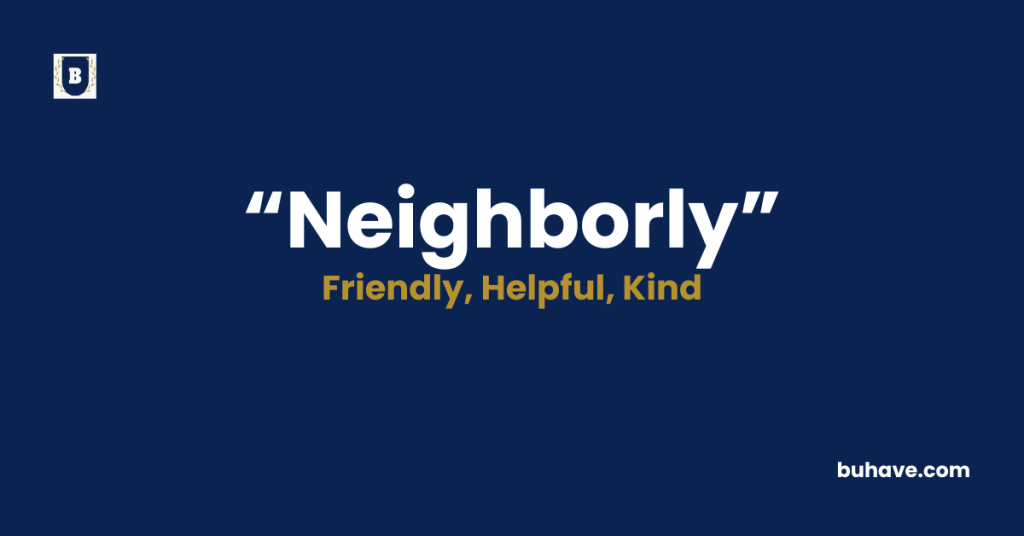The word ‘Neighborly’ (Adjective) describes the kind and helpful behavior typically shown by someone toward their neighbors or people living nearby. In this guide, you’ll learn the full definition, synonyms, antonyms, etymology, and real-life examples of how to use ‘Neighborly’ correctly in sentences.
Neighborly Explained in Depth
A complete and detailed guide to the word Neighborly including meaning, definition, examples, etymology, synonyms, and antonyms.
Meanings of Neighborly
The word “neighborly” means showing friendliness, kindness, and helpfulness toward people who live near you. When someone behaves neighborly, they often act with warmth and consideration, making an effort to build good relationships within their community or neighborhood. This behavior goes beyond mere politeness — it involves being genuinely supportive and willing to lend a hand when others need it. For example, if your neighbor offers to help you carry groceries inside or waters your plants while you are away, that is neighborly behavior. Similarly, organizing a block party or helping to keep the neighborhood safe reflects a neighborly spirit.
Neighborly behavior is often seen as a sign of strong community values and social trust. It creates a sense of belonging and encourages people to look out for each other, which can be especially important in times of need or emergencies. In everyday life, people describe acts of kindness and cooperation in their neighborhood as neighborly, highlighting the warmth and goodwill that come from caring about those who live nearby. Ultimately, being neighborly is about building connections, sharing goodwill, and contributing positively to the lives of those around you.
Definition
Neighborly refers to showing qualities of friendliness, helpfulness, and kindness toward neighbors or others living nearby. It describes actions or attitudes that foster a supportive and welcoming community environment. This includes offering assistance, sharing resources, and demonstrating care and respect for neighbors’ well-being and property. The word captures the idea of active goodwill and the desire to maintain harmonious and supportive relationships with those living close by. Rather than being indifferent or distant, neighborly behavior builds trust and goodwill, helping create a safer and more enjoyable living environment for everyone.
Etymology
The word “neighborly” finds its roots deep in the English language, originating from the base word “neighbor.” This term “neighbor” dates back to Old English “neahgebur,” which literally means “near dweller” — someone who lives nearby or close to you. The components of this Old English word include “neah,” meaning “near,” and “gebur,” meaning “dweller” or “farmer,” which together describe a person dwelling near your home.
Over time, the suffix “-ly” was added to “neighbor” to form the adjective “neighborly,” which characterizes the qualities or behavior expected of a good neighbor. This suffix is common in English to turn nouns into adjectives that describe related attributes or mannerisms.
The word evolved through Middle English as “neighbourly,” maintaining the same meaning of being friendly and helpful to neighbors. Throughout history, as communities grew and people recognized the importance of social harmony, the idea of being neighborly came to represent more than mere proximity—it embodied the social responsibilities and mutual kindness necessary to live peacefully together. The word “neighborly” therefore reflects centuries of cultural values emphasizing care, cooperation, and goodwill within local communities.
Example Sentences
- She was very neighborly, always offering to help with errands or share fresh vegetables from her garden.
- Our neighborly community comes together every year to organize a festive block party.
- It’s neighborly to check on someone who hasn’t been outside for a while, especially during harsh weather.
- The neighborly gestures in this neighborhood create a welcoming atmosphere for newcomers.
Neighborly Synonyms
- Friendly
- Helpful
- Kind
- Considerate
- Supportive
- Welcoming
- Generous
- Caring
- Neighbor-like
- Obliging
Neighborly Antonyms
- Unfriendly
- Hostile
- Indifferent
- Cold
- Unhelpful
- Rude
- Unsupportive
- Aloof
- Neglectful
- Selfish
FAQs about Neighborly
Here are some frequently asked questions (FAQs) about the word “Neighborly”
1.What does “neighborly” mean?
“Neighborly” means showing friendliness, kindness, and helpfulness to people who live near you. It involves being considerate and supportive toward neighbors.
2.Can “neighborly” describe behavior outside of residential areas?
Yes, while it usually applies to neighbors in a community, “neighborly” can also describe similar friendly and helpful behavior in workplaces or any group setting.
3.Is being neighborly important?
Absolutely. Being neighborly fosters community trust, support, and a safer, more enjoyable environment for everyone.
4.How can I be more neighborly?
You can be neighborly by offering help, greeting neighbors warmly, sharing resources, or participating in community events.
5.Is “neighborly” always positive?
Yes, the word “neighborly” always has a positive meaning related to kindness and helpfulness.
6.Can “neighborly” describe a person?
Yes, it can describe someone who regularly shows friendliness and helpfulness to their neighbors.
7.Does “neighborly” apply only to people?
While mostly about people, “neighborly” can describe attitudes or gestures that promote harmony and goodwill in any social context.
8.Is neighborly behavior common worldwide?
Many cultures value neighborly behavior as a foundation for strong communities, though customs and expectations can vary.
9.Can neighborly acts improve safety?
Yes, neighborly acts like looking out for each other can increase safety and security in a neighborhood.
10.Can children be neighborly?
Absolutely. Teaching children neighborly values helps build their social skills and community awareness.
Explore more N words:
Positive words that start with N
Negative words that start with N
Nouns that start with N
Verbs that start with N

















